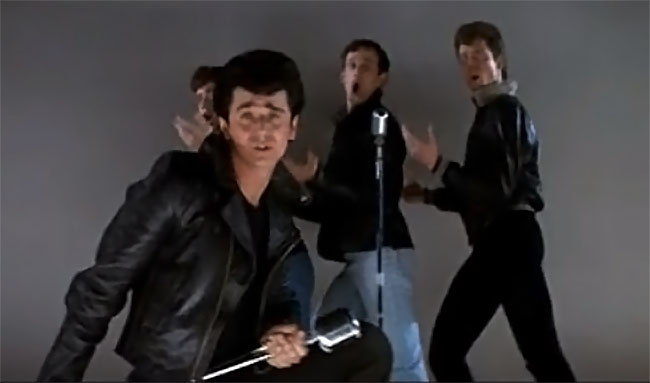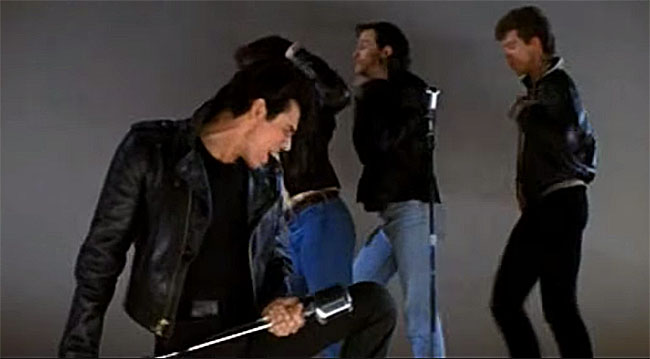I’m gonna show you cats some action,
Like you’ve never seen before.
We’re gonna get some satisfaction
Down at the grocery store
Once upon a time there was this terrible musical that was turned into a terrible film that rode the wave of nostalgia for 1950’s America into the theaters and straight to the bank. Hoping to turn this terrible film into a terrible franchise, a sequel was released a few years later, a sequel that, mercifully, bombed, and thus destroyed any future prospects for the terrible franchise.
By many standards of evaluation, Grease 2 is one of the worst films ever made. It’s crassly manipulative, it’s incoherent, it’s undeniably stupid, and perhaps most offensively, it seems gleefully unaware of many of its own flaws.
All of this makes it a good sequel, sharing all of these characteristics with its parent film. Also like its progenitor, Grease 2 features a cast of teenagers portrayed by men and women in their 20’s and 30’s. More damaging, the producers appear to have cast the film without regard to singing ability. And the cast is definitely doing their own singing.
The Pat Benetar role is sung by the charming but vocally strained Michelle Pfeiffer, who is at least capable of communicating with her voice, even when the style of the songs doesn’t suit her reedy tone. An early song, the atrocious Cool Rider, makes clear both her charms (funny and somehow sensual dance with a stepladder) and her vocal limitations. But things don’t get truly disastrous until her duets with her co-star Maxwell Caulfield, who possesses neither the voice for the role nor, apparently, a sense of pitch.
Pfeiffer wants a rider. That’s Cool. A Cool Rider.
Love Will Turn Back the Hands of Time, otherwise known as, Harmony is Hard When Your Possibly-Dead Motorcycle Angel Boyfriend Can’t Sing.
Worse yet, the songs themselves are a mess of slick eighties instrumentation, pseudo-50’s rock, and ridiculous sexual innuendo, making only the barest of attempts to connect themselves to the thin plot that proceeds around them. The songs are so unrelated to the action that they could easily have been written for any other sex and nostalgia-obsessed musical floating around at the time.
So why write about Grease 2 in the first place? And why have I even seen it?
I managed to make it into adulthood without being exposed to either of these movies, and I might have made it even further, if it wasn’t for my friend and pop culture obsessive/some-time employer James Brendlinger, who in 2007, paid me the princely sum of $30 a piece to record karaoke tracks for a quasi-legal one-off stage production. What can I say? I was young, I needed the money.
This, as you might be able to imagine, was a punishing job, and having “Girl For All Seasons” in my head for an entire week is not how I fantasized I’d be exploiting my rock and roll skills as an adult.
Yet, that one song– that one about sexy times at the grocery store. That one was pretty good. And who was that singer?
Adrian Zmed, of T.J. Hooker fame. Adrian Zmed, it appears, is a great fucking singer.
On TJ Hooker, Zmed portrays the green cop, the wide-eyed Italian-by-way-of-Romania who is the young foil to William Shatner’s weary, seen it all Sergeant Hooker. While he’s excellent on the show, it’s not exactly a part with a lot of room to stretch.
But man o man, does Zmed make the most out of his minutes here.
Not surprising for a movie directed by a choreographer, Grease 2 is filled to the brim with dancing and arranged movement of all types, including motorcycular. But among all the color, all the gyration and spectacle, it’s Zmed that stands out, Zmed that stalks the screen, grinds his hips, yowls, and suddenly collapses, clumsy and shy and vulnerable. It’s Zmed that has the voice, the strength, and the commitment to transcend the very clear limitations of this material.
It’s Zmed that should have been a star.

And yet it’s Pfeiffer that survived this turkey, along with director Patricia Birch, who would continue to work as a successful choreographer, even though her directing days were over.
It’s one of the things that’s most intriguing about truly bad group art– about art that fails not from over-reach, but from lack of any real ambition in the first place. Somewhere inside this accidental assemblage of cliche and commercial concession, there are all of these possibilities, all of these what-ifs waiting to be written. If great art can be intimidating, even distancing in its perfection, then truly bad art can sometimes be approachable, hopeful.
I’m not suggesting you watch Grease 2, not unless you’re a masochist for this kind of thing. But I am suggesting that you give this sequence a spin and wonder with me. What if? What if Adrian Zmed had been given a role equal to his talents, a role that required equal parts vulnerability, sensitivity, confident physicality, and lusty vocalization? When we regard an actor, do we regard him for his role, or what he manages with what he has been given?
It is the curse of the actor to be limited to the words and works of others.
What are you doing now, Adrian Zmed? It’s been over thirty years. It might finally be time to revive the franchise. What do you say? Want to give being a teenager another spin?
I leave you with something excellent, and stylistically related — the Paul Williams-penned “Goodbye Eddie, Goodbye,” from Brian DePalma’s Phantom of the Paradise.
This post is part of a series called Panoptisongs, focusing on multi-dimensional analysis of popular songs.

